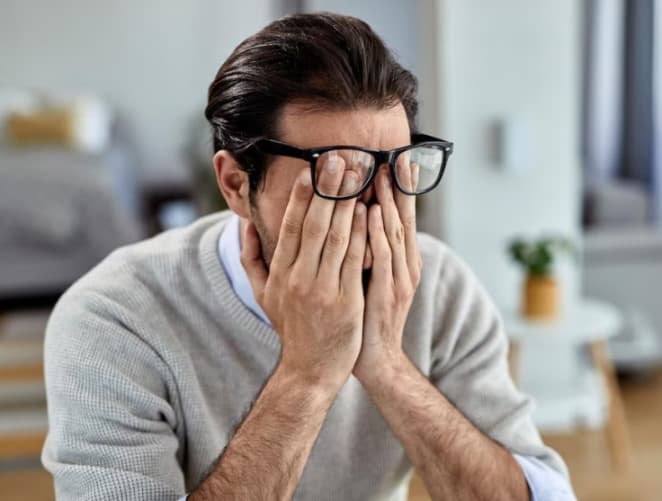Have you ever experienced a pulsating sensation in your eye? It can be an uncomfortable and perplexing phenomenon that leaves you wondering what could be causing it.
In this comprehensive article, we will explore the reasons behind why you might feel a pulse in your eye, delve into potential causes, and provide helpful insights to put your mind at ease. So, let’s dive in and uncover the mysteries of eye pulsations!
Why Do I feel a Pulse in My Eye?
Feeling a pulse in your eye can be a disconcerting experience, but rest assured, it is usually not a cause for alarm. In most cases, these pulsations are harmless and temporary, often resolving on their own.
However, it’s essential to understand the underlying factors that contribute to this sensation. Let’s explore some possible reasons:
Eye Strain and Fatigue
One common cause of eye pulsations is eye strain and fatigue. When we engage in prolonged activities that require intense focus, such as reading, using digital devices, or driving for extended periods, our eye muscles can become overworked. This strain can lead to muscle spasms, resulting in the perception of a pulse in the eye.
Dry Eye Syndrome
Dry eye syndrome occurs when the eyes do not produce enough tears or when the tears evaporate too quickly. The resulting dryness and irritation can lead to eye twitching and pulsations.
Stress and Anxiety
Stress and anxiety can manifest in various ways, and eye pulsations are among the potential symptoms. When we experience high levels of stress, our body’s stress response can trigger muscle contractions and tension. These contractions can affect the muscles around the eye, leading to pulsations.
Caffeine and Stimulants
Have you recently consumed a large amount of caffeine or other stimulants? These substances can have stimulating effects on the body, including increasing heart rate and blood pressure. When this occurs, you may notice pulsations in different parts of your body, including the eyes.
Lack of Sleep
Adequate sleep is crucial for our overall well-being, including the health of our eyes. When we don’t get enough sleep, our body can experience various symptoms, including eye pulsations.
Sleep deprivation can lead to eye strain, dryness, and muscle fatigue, all of which can contribute to the sensation of a pulse in the eye.
Neurological Conditions
In some cases, eye pulsations can be associated with underlying neurological conditions such as blepharospasm or hemifacial spasm. These conditions cause involuntary muscle contractions, including those around the eyes.
Read Also: Diabetic Retinopathy and Your Eyesight
How to Treat Eye Pulsations
If you experience a eye pulsations, there are several steps you can take to address the issue:
Rest Your Eyes
If you frequently experience eye pulsations, it might be a sign of eye strain or fatigue. To reduce eye strain, take regular breaks from prolonged screen time, especially when working on computers or using electronic devices.
Follow the 20-20-20 rule: Every 20 minutes, look at something 20 feet away for about 20 seconds to give your eyes a chance to relax.
Avoid Eye Irritants
If you wear contact lenses, make sure to follow proper hygiene and care guidelines. Avoid wearing contact lenses for extended periods, especially when they cause eye irritation or discomfort.
Reduce Caffeine and Manage Stress
Cutting back on caffeine consumption and finding healthy ways to manage stress can help reduce eye pulsations triggered by these factors.
Stay Hydrated
Dehydration can lead to eye discomfort and pulsations. Ensure you drink an adequate amount of water throughout the day to maintain good hydration and support proper blood circulation.
Use Lubricating Eye Drops
For individuals with dry eye syndrome, using over-the-counter lubricant eye drops can help relieve dryness and reduce eye pulsations. These drops provide the eyes with the necessary moisture and can alleviate discomfort.
Manage Allergies
If eye pulsations are triggered by allergies, it’s essential to manage them effectively. Consult with an allergist to identify the allergens causing the reaction and explore appropriate treatment options such as antihistamines or allergy shots.
FAQs about Eye Pulsations
Now that we’ve explored some potential causes and prevention of eye pulsations, let’s address a few frequently asked questions to provide further clarity.
Are eye pulsations dangerous?
In most cases, eye pulsations are harmless and not indicative of a serious underlying condition. However, if you experience persistent or severe pulsations accompanied by other concerning symptoms, it’s advisable to consult an eye care professional.
How long do eye pulsations typically last?
The duration of eye pulsations can vary from person to person and depends on the underlying cause. In general, pulsations caused by temporary factors, such as fatigue or stress, tend to resolve on their own within a short period.
Can eye pulsations be prevented?
While it may not always be possible to prevent eye pulsations entirely, there are steps you can take to minimize their occurrence. These include practicing good eye hygiene, taking regular breaks from activities that strain your eyes, managing stress levels, and ensuring you get enough sleep.
Can eye pulsations be a sign of a serious eye condition?
While eye pulsations are typically benign, they can rarely be a symptom of an underlying eye condition. Conditions such as glaucoma, ocular migraine, or uveitis may cause pulsations in some cases.
Are there any home remedies for relieving eye pulsations?
Yes, there are some simple home remedies that may help alleviate eye pulsations. Applying a warm compress to your eyes, practicing relaxation techniques, such as deep breathing or meditation, and ensuring you get enough rest and sleep can all contribute to reducing eye pulsations.
Conclusion
Experiencing a pulse in your eye can be a puzzling sensation, but it’s usually nothing to be overly concerned about. Eye pulsations are often caused by factors such as eye strain, stress, caffeine consumption and lack of sleep.
By understanding these common triggers and taking steps to minimize their impact, you can alleviate eye pulsations and maintain optimal eye health.

